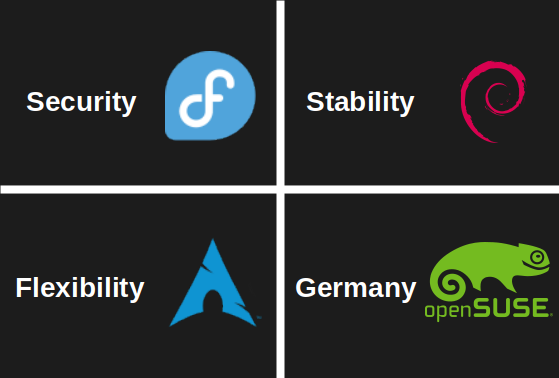this post was submitted on 13 Dec 2024
950 points (98.6% liked)
linuxmemes
21616 readers
1514 users here now
Hint: :q!
Sister communities:
Community rules (click to expand)
1. Follow the site-wide rules
- Instance-wide TOS: https://legal.lemmy.world/tos/
- Lemmy code of conduct: https://join-lemmy.org/docs/code_of_conduct.html
2. Be civil
- Understand the difference between a joke and an insult.
- Do not harrass or attack members of the community for any reason.
- Leave remarks of "peasantry" to the PCMR community. If you dislike an OS/service/application, attack the thing you dislike, not the individuals who use it. Some people may not have a choice.
- Bigotry will not be tolerated.
- These rules are somewhat loosened when the subject is a public figure. Still, do not attack their person or incite harrassment.
3. Post Linux-related content
- Including Unix and BSD.
- Non-Linux content is acceptable as long as it makes a reference to Linux. For example, the poorly made mockery of
sudoin Windows. - No porn. Even if you watch it on a Linux machine.
4. No recent reposts
- Everybody uses Arch btw, can't quit Vim, and wants to interject for a moment. You can stop now.
Please report posts and comments that break these rules!
Important: never execute code or follow advice that you don't understand or can't verify, especially here. The word of the day is credibility. This is a meme community -- even the most helpful comments might just be shitposts that can damage your system. Be aware, be smart, don't fork-bomb your computer.
founded 2 years ago
MODERATORS
you are viewing a single comment's thread
view the rest of the comments
view the rest of the comments

I'll never stop hating that debian is labeled stable. I'm fully aware that they are using the definition of stable that simply means not updating constantly but the problem is that people conflate that with stability as in unbreaking. Except it's the exact opposite in my experience, I've had apt absolutely obliterate debian systems way too often. Vs pacman on arxh seems to be exceptionally good at avoiding that. Sure the updated package itself could potentially have a bug or cause a problem but I can't think of any instance where the actual process of updating itself is what eviscerated the system like with apt and dpkg.
And even in the event of an update going catastrophically wrong to the point that the system is inoperable I can simply chroot in use a statically built binary pacman and in a oneliner command reinstall ALL native packages in one go which I've never had not fix a borked system from interrupted update or needing a rollback
You are maybe conflating stability with convenience.
"Why is this stable version of my OS unstable when I update and or install new packages...."
The entire OS falling down randomly on every distribution during normal OS background operations was always an issue or worry, and old Debbie Stables was meant to help make linux feel reliable for production server use, and it has done a decent job at it.
I mean when I can take an Arch Linux installation that I forgot about on my server and is now 8 years out of date and simply manually update the key ring and then be up to date without any issue but every time I've ever tried to do many multiple major version jumps on debian it's died horrifically... I would personally call the latter less stable. Or at least less robust lol.
I genuinely think that because Arch Linux is a rolling distribution that it's update process is just somehow more thorough and less likely to explode.
The last one with debian was a buster to bookworm jump. Midway through something went horrifically wrong and dpkg just bailed out. The only problem was that it somehow during all of that removed the entirety of every binary in /bin. Leaving the system completely inoperable and I attempted to Google for a similar solution as arch. Where i could chroot in and fix it with one simple line. But so far as I was able to find there is no such option with apt/dpkg. If I wanted to attempt to recover the system it would have been an entirely manual Endeavor with a lot of pain.
I would also personally label having the tools to recover from catastrophic failure as being an important part of stability especially when people advocate for things like Debian in a server critical environment and actively discourage the use of things like Arch
If the only thing granting at the title of stability is the lack of update frequency that can simply be recreated on Arch Linux by just not updating frequentlyಠ_ಠ
No opinion on Debian but as a heavy ArchLinux user I should point out you shouldn't upgrade without reading the news as occasionally manual intervention is required. Upgrades can and will break things if you're not careful.
https://archlinux.org/news/openblas-0323-2-update-requires-manual-intervention/
https://archlinux.org/news/ansible-core-2153-1-update-may-require-manual-intervention/
https://archlinux.org/news/incoming-changes-in-jdk-jre-21-packages-may-require-manual-intervention/